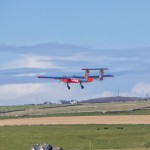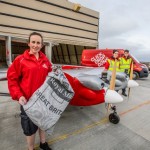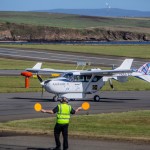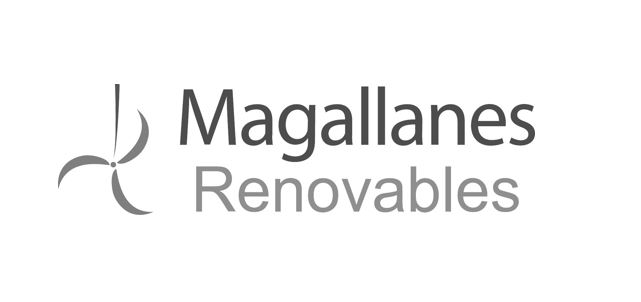Press release: Funding boost for sustainable aviation testing in Orkney
Funding confirmed for phase 2 of SATE project
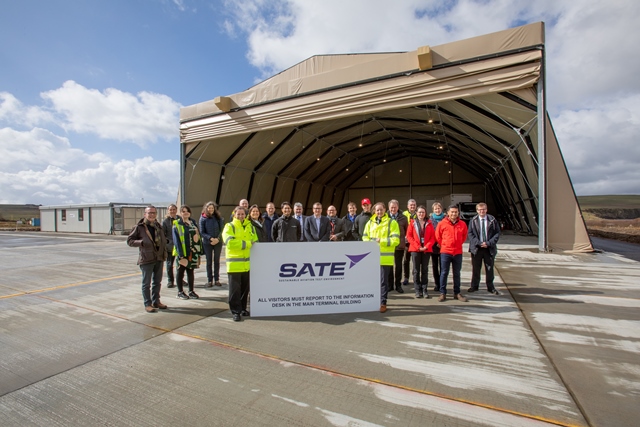
The consortium at the opening of the SATE hangar facilities at Kirkwall Airport facilities during phase one (credit EMEC)
The Sustainable Aviation Test Environment (SATE), based at Kirkwall Airport in the Orkney Islands, has been given a funding boost to support the Highlands and Islands of Scotland in becoming a sustainable aviation region.
UK Research and Innovation (UKRI) has awarded the second phase of the SATE project £8.9 million funding as part of the Future Flight Challenge competition. The funding, which is awarded to innovation projects demonstrating integrated aviation systems and novel air vehicles, will support the project’s ambition to scale up and become the UK centre of excellence for sustainable regional aviation.
Led by Highlands and Islands Airports Ltd (HIAL), the funding will allow SATE to build on phase one which created the UK’s first low-carbon aviation test centre embedded at a commercial airport. The initial project saw the opening of dedicated hangar facilities and office space for technology developers as well as facilitating a number of demonstration flights of novel aviation technologies. Trials included: a collaboration between drone specialist technology firm Windracers with Royal Mail on autonomous flights for mail delivery; Flare Bright’s parcel-sized gliding drone system; and the first hybrid electric flights for Scotland by US company Ampaire.
While phase one established the test centre, SATE 2 aims to expand on the success that has already been delivered and develop a UK centre of excellence for sustainable regional aviation.
The project will match innovative aviation technologies with practical use cases in the Highlands and Islands, allowing technology partners to test in a real-world environment, taking them closer to offering sustainable innovation options for commercial use. Identified use cases include:
• Scheduled airline routes;
• Offshore energy services;
• National Health Service activities;
• Island / remote region deliveries;
• Environmental survey and inspection.
In addition, SATE 2 aims to establish an unmanned aerial vehicle (UAV) hub-and-spoke delivery network, and will conduct demonstration flights of technologies including a hydrogen-electric regional aircraft and a drone flight from Scotland to Norway.
EMEC will support the hydrogen-electric flight trials in the project by supplying green hydrogen and the use of a bespoke hydrogen refuelling system compatible with an airport environment.
As an exemplar early-adopter of other low-carbon technologies, Orkney is seen an ideal ‘living laboratory’ for testing aviation and aerospace technology. Kirkwall Airport is well suited as a test environment location due to the variety of short routes it offers acting as a hub connecting Orkney’s Island communities through its inter-island flight service. While the SATE facilities are based at Kirkwall Airport, phase two involves plans to work with other Highlands and Islands communities.
HIAL chair Lorna Jack, said:
“The SATE 2 project will allow all the partners to really drive forward a range of low-carbon services and technologies that will have a tangible benefit to communities in the Highlands and Islands and beyond. Our partners are genuinely innovative pioneers committed to adapting to rapidly changing environmental challenges.
“SATE also plays a key role in delivering HIAL’s environmental objective to decarbonise our operations and our long-term vision to become a net-zero carbon regional airport group.
“We continue with our aim for all 11 of our airports to be carbon neutral as we strive to deliver an environmentally sustainable future for aviation services.”
Matthew Finn, EMEC’s Commercial Director, said:
“Orkney has a proud heritage of demonstrating cutting edge low carbon technologies, having been the testing ground for some of the first megawatt scale wind turbines in the 1950s and ‘80s, and more recently for wave and tidal energy, and green hydrogen technology. The county generates over 100% of its electricity demand from renewable energy and leads the way in areas such as electrical vehicle uptake and clean energy production at a domestic level. With a range of inter-island flights, as well as lifeline connections to mainland UK, Orkney serves the perfect demonstration environment for low-carbon aviation technologies.
“EMEC’s R&D activities in green hydrogen production will feed directly into the project enabling us to further demonstrate our hydrogen refuelling systems in a real-world environment along with sharing our experience with HIAL in how to operate a low carbon test and demonstration facility.”
Gary Cutts, Future Flight Challenge Director at UKRI, said:
“The world is on a journey towards net zero and it is vital that the aviation industry is not left behind. In Phase 2 of the Future Flight challenge, we supported the SATE consortium in creating the UK’s first low-carbon aviation test centre. Now, with this extra funding, we look forward to seeing how SATE 2 develops into a UK centre of excellence for sustainable aviation systems.”
SATE brings together an international consortium of 12 partners, from industry, public sector academia. The partners are; HIAL, Arcadis Consulting Limited, Connected Places Catapult, The European Marine Energy Centre (EMEC), Flare Bright Ltd, The Highlands and Islands Transport Partnership, Loganair Limited, University of Highlands and Islands (UHI), Windracers Limited. Zeroavia Limited; Highlands & Islands Enterprise (HIE); and Orkney Islands Council. The project is also working closely with other local authority agencies.
The consortium will continue to look at how to implement zero-carbon airport infrastructure using green energy sources. The project has the potential to create exciting inward investment opportunities, which will require the skills and training needed to support them generating a positive socio-economic impact for the Highlands and Islands.
